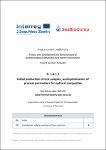Initial production of test samples, and optimisation of process parameters for optimal composites
| dc.contributor.author | Qin, Y | |
| dc.contributor.author | Summerscales, John | |
| dc.contributor.author | Cullen, R | |
| dc.contributor.author | Graham-Jones, Jasper | |
| dc.contributor.author | Meng, M | |
| dc.contributor.author | Pemberton, R | |
| dc.contributor.other | Interreg 2 Seas 2014-2020 | |
| dc.date.accessioned | 2023-05-05T14:06:05Z | |
| dc.date.available | 2023-05-05T14:06:05Z | |
| dc.date.issued | 2020-11-30 | |
| dc.identifier.other | SeaBioComp D1.4.1..1 | |
| dc.identifier.uri | https://pearl.plymouth.ac.uk/handle/10026.1/20842 | |
| dc.description.abstract |
Due to the greater awareness of the environmental issues, composite researchers are increasingly interested in using “greener” materials to substitute for synthetic fibre reinforcements and petrochemical polymer matrices. Therefore, in order to minimise the ecological impact, the SeaBioComp project aims to produce natural fibre bio-based thermoplastic composites for marine applications. The University of Plymouth is developing monomer infusion under flexible tooling (MIFT) for the manufacture of bio-based composites. In Deliverable 1.1.3, the material selection identified methylmethacrylate (MMA) and lactic acid/lactide for PLA as potential matrix systems for use in the marine environment. MMA is not yet bio-based, but expected to become available as such around the end of the project. It could sensibly “drop in” as a substitute for unsaturated polyester or epoxy resins processable at ambient temperatures. The manufacture of PLA requires that the monomer feed vessel, the associated pipework and the mould tool are all heated to temperatures between 120-180C. Deliverable D1.4.1 “Report on the development of heated mould tools, initial production of test samples, and optimisation of process parameters for optimal composites” has been split to two parts: D1.4.1.1 Initial production of test samples, and optimisation of process parameters for optimal composites D1.4.1.2 The development of heated mould tools This report considers the process optimisation suggesting that temperatures for all stages of the PLA process will be 150C. Process development will continue using a preliminary heating system from Jiangyin Jin Yu Electric Heating Company Limited for flat plate manufacture. In the absence of a decision on the demonstrator component some aspects of the mould tool design remain open and will be addressed in Deliverable D1.4.2 Creation of a 3D mould tool with sensible temperature uniformity. Demonstrators under consideration include scaled-down marine renewable energy turbine blades or components of floating offshore wind turbines. | |
| dc.title | Initial production of test samples, and optimisation of process parameters for optimal composites | |
| dc.type | report | |
| plymouth.confidential | true | |
| plymouth.organisational-group | |Plymouth | |
| plymouth.organisational-group | |Plymouth|Research Groups | |
| plymouth.organisational-group | |Plymouth|Faculty of Science and Engineering | |
| plymouth.organisational-group | |Plymouth|Faculty of Science and Engineering|School of Engineering, Computing and Mathematics | |
| plymouth.organisational-group | |Plymouth|Research Groups|Marine Institute | |
| plymouth.organisational-group | |Plymouth|REF 2021 Researchers by UoA | |
| plymouth.organisational-group | |Plymouth|Users by role | |
| plymouth.organisational-group | |Plymouth|Users by role|Academics | |
| plymouth.organisational-group | |Plymouth|REF 2021 Researchers by UoA|UoA12 Engineering | |
| plymouth.organisational-group | |Plymouth|REF 2021 Researchers by UoA|UoA12 Engineering|UoA12 Engineering MANUAL | |
| dc.date.updated | 2023-05-05T14:06:04Z |


